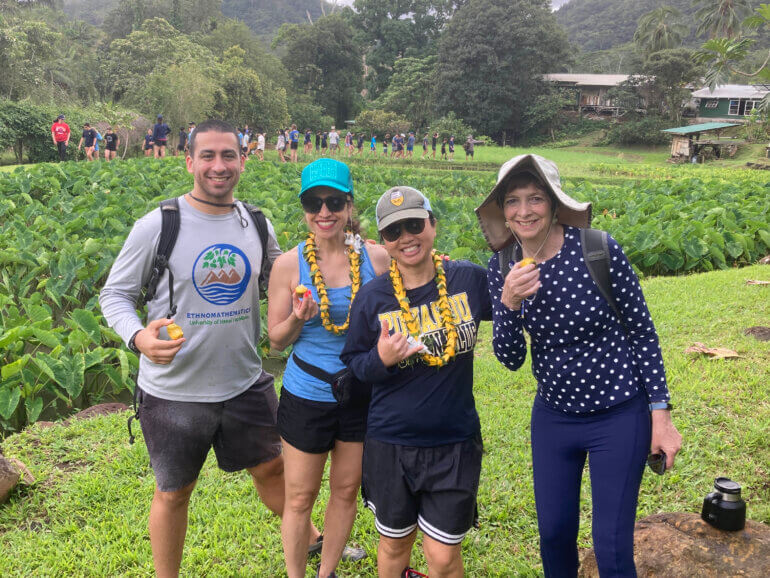Punahou School’s Davis Democracy Initiative recently hosted scholar Dr. Rochelle Gutiérrez from March 4 – 7. Gutiérrez shared her heightened sense of kuana‘ike (perspective and worldview) with our community, engaging across the Punahou community both on and beyond campus. Gutiérrez, a professor of Curriculum and Instruction at the University of Illinois Urbana-Champaign, is an activist and self-proclaimed “frequent user of creative insubordination.” Best known for her work in the field of mathematics education, Gutiérrez’s research and practice explore dimensions of equity in mathematics, revealing how indigenous ways of knowing can reconceptualize STEM education.
Gutiérrez’s visit was not a typical residency. Conducted in a spirit of reciprocity, Punahou introduced Hawaiʻi and the school to Gutiérrez, and she responded with her observations of both common ground with her Chicana and Rarámuri heritage, as well as precise cultural differences. Gutiérrez joined “mauka to makai” place-based experiences with Punahou seventh graders at the Reppun Farm in Waiāhole Valley, where she helped students measure the kalo fields – mathematics in action. She was accompanied by Dr. Linda Furuto, ‘97, professor of Mathematics Education at the University of Hawai‘i at Mānoa. Furuto is the founder of the first ethnomathematics graduate program in the country and a 2023 Obama Foundation Global Leader. Furuto shared her expertise in lifting up Hawai’i as a laboratory for mathematics education, whether through her time as an apprentice navigator on Hōkūle‘a or her study of Hawaiʻi’s ecological habitat. Gutiérrez and Furuto also boarded Kamaola, Punahou’s double-hulled sailing canoe and outdoor classroom, which participated in the Hakipu’u Canoe Festival in March.
On campus, Gutiérrez and Furuto connected with fifth and 10th grade mathematics classrooms. Nicole Schofield’s fifth grade class explored the mathematics that nature holds, while Micah Pavich’s 10th grade geometry class delved into narratives inherent to math. In the seventh and fourth grade assemblies, Gutiérrez shared how math is everywhere, from the exquisite shapes of the fronds of ferns on campus to the tidy, coiled rope on the deck of Kamaola. Visiting students from DreamHouse ‘Ewa Beach public charter school, Academy English and social studies students, and Davis Democracy Fellows together learned techniques of creative insubordination, exploring how they could develop strategies to implement their beliefs in the world. Gutiérrez also met with math educators and members of Punahou’s student affinity clubs, such as the Latin and Hispanic Club, the Black Students’ Union, and the Polynesian Club.
The visit concluded with two public addresses: a keynote address delivered by Gutiérrez and Furuto titled “Restor(y)ing our Futures,” and a roundtable discussion called “Weaving Under the Hala Tree.” “What righteous acts will help remake you and your people?” Gutiérrez challenged the audience. “The universe is our greatest textbook,” commented Furuto, adding “When did any real problem in life have an integer as an answer?” Moderated by growth coach Meilan Akaka Manfre ‘04, the roundtable included Gutiérrez; Furuto; Malia Ane, ‘72, retired co-director of Hawaiian Studies (now Kuahelani Learning Center); Ke‘alohi Reppun ‘99, Director of Kuaihelani Learning Center; and master navigator Kaniela Lyman-Mersereau ‘05. Gutiérrez and Furuto advocated for embedding indigenous knowledge and political awareness into education to foster a more inclusive, equitable educational landscape and provide students with relevant academic knowledge and a profound understanding of the larger world. The roundtable participants reflected on the development and flourishing of ‘ike Hawaiʻi at Punahou, taking questions from the audience.
The three days of activities and discussions allowed students and faculty to engage in meaningful conversation around a vision for a more immersive, inclusive and diverse future in education. Patricia Socias ‘24, co-leader of the Latin and Hispanic club reflected: “It was beyond meaningful to listen to both Dr. Furuto and Dr. Gutiérrez tell the stories of their upbringings, and how that affected their careers and the way they carry themselves today. It was fascinating to hear about the connections between mathematics and diverse communities, and how these connections can be applied elsewhere in schools.”
Gutiérrez’s visit touched approximately 550 students at Punahou, 25 students from DreamHouse ‘Ewa Beach, and 250 K – 12 educators, as well as interested members of the public, policy leaders and practitioners in higher education, coming to Punahou from as far as Maryland and Minnesota.
– By David Ball, Pamela Sakamoto and Joseph Manfre










